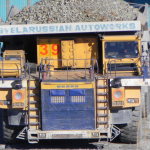Interview with Harris Kupperman, CEO of Mongolia Growth Group
 Harris Kupperman is head of Praetorian Capital, a hedge fund which has been fantastically successful. Harris traveled to Mongolia because he believes it has major growth ahead over the next twenty years and he wanted to see it first-hand. He realized the best way to get investment exposure to Mongolia was to start a company in Mongolia which would reap the rewards of the tremendous growth of Mongolia and specifically its mining sector.
Harris Kupperman is head of Praetorian Capital, a hedge fund which has been fantastically successful. Harris traveled to Mongolia because he believes it has major growth ahead over the next twenty years and he wanted to see it first-hand. He realized the best way to get investment exposure to Mongolia was to start a company in Mongolia which would reap the rewards of the tremendous growth of Mongolia and specifically its mining sector.
Mongolia is one of the most resource-rich countries in the world. Marc Faber has called it the Saudi Arabia of Asia. Commodities have been in a bull market for more than 10 years but the boom in Mongolia is just moving off its ground floor. The company, Mongolia Growth Group, trades under the symbol “YAK” in Canada and “MNGGF” in the USA. Click Here to visit Harris’ Blog.
 Jordan: You call Mongolia “The best investment story that no one has ever heard of.” What do you mean by that?
Jordan: You call Mongolia “The best investment story that no one has ever heard of.” What do you mean by that?
Harris: If you look at my hedge fund, which is up over 20-fold on a gross basis since inception, we have been very successful at finding macro trends with huge secular tail-winds, buying the best assets and ignoring the volatility along the way. That’s how you have big returns. I see Mongolia in a similar way. There is a huge secular tail-wind under way, this tail-wind will go on for decades and assets are simply not priced for the upside that we see.
Jordan: Can you explain the tail-wind that you see.
Harris: Let’s look at some very broad numbers. Mongolia has 2.7m million people and a 2010 GDP of around $5 billion. At the same time, Ivanhoe’s Oyu Tolgoi (OT) copper mine is a $6-$7 billion cap-ex project that will produce roughly $7 billion dollars of metal a year at today’s metal prices. That one mine is bigger than the whole economy! Then you have Tavan Tolgoi (TT) which is the largest coking coal deposit in the world. The Mongolian Government is in the final phase of deciding who will mine it. Tavan Tolgoi is of a similar size as OT. So you have two different mines that are each individually bigger than the whole economy of Mongolia!
Jordan: Right.
 Harris: Then add in all the smaller mines that no one talks about because they’re only a few hundred million in size. There’s something like $30 to $50 billion in cap-ex to be spent in the next few years in Mongolia and the GDP was only $5 billion last year. In 2010, Mongolia exported roughly $2 billion in minerals. Based on world metal prices and the speed that the various mining projects start-up, you have exports growing to somewhere between $20 and $80 billion a year by 2017. These are huge increases. Just huge! When have exports ever grown between ten and forty-fold in just a few years?
Harris: Then add in all the smaller mines that no one talks about because they’re only a few hundred million in size. There’s something like $30 to $50 billion in cap-ex to be spent in the next few years in Mongolia and the GDP was only $5 billion last year. In 2010, Mongolia exported roughly $2 billion in minerals. Based on world metal prices and the speed that the various mining projects start-up, you have exports growing to somewhere between $20 and $80 billion a year by 2017. These are huge increases. Just huge! When have exports ever grown between ten and forty-fold in just a few years?
Jordan: Where will all this money go? I mean, how do you even put that much cap-ex into such a small economy?
Harris: I’m really not sure how it will all work. No one does. Nothing like this has ever happened.
Jordan: But won’t every asset class simply go parabolic?
Harris: That’s pretty much our working thesis.
Jordan: So how do you “play” it?
Harris: This is the funny part, there’s pretty much no way to get direct exposure to the economy. You can buy large-cap mining stocks, but these tend to be fairly valued. Besides, they give you leverage to some commodity, not to the coming boom in Mongolia. You can buy shares on the Mongolian Stock Exchange (MSE), but most MSE companies are illiquid with dismal public disclosure. Even with that caveat, my fund owns shares in many of the largest companies. If Mongolia does well, most of these companies will do well. Besides, they’re all quite cheap. It’s like no one out there realizes how big this boom will be.
Jordan: How cheap are they? What’s the valuation?
Harris: It’s hard to talk about valuations as only one company on the whole exchange has audited financials. Put it this way, the largest company on the exchange currently trades with an 18% dividend yield and that yield has been growing at a mind-numbing rate over the last few years. Many of the smaller companies are even cheaper. If I knew what the real numbers were on these companies, I’d be a much more aggressive buyer—but honestly, without audited financials; I cannot put real money into any of them.
Jordan: Tell us a bit about your company, Mongolia Growth Group?
Harris: We have purchased rentable real estate and are in the process of obtaining an insurance license. We’re a young company, so there isn’t that much to say yet. Instead, let me talk a bit about the strategy. Basically, we looked at other huge booms through history, though nothing of this magnitude has ever happened before. We looked at Qatar, Dubai, Kazakhstan and Saudi Arabia. What sectors did the best during the boom phase? If you ignore the commodity sectors, which we are, the next best places are financial services and real estate.
Jordan: Why is that?
Harris: Financial services tend to be good businesses to begin with. When an economy booms, you get huge operating leverage. We like that. We also see Mongolia as a country with very low penetration of many services like insurance which we intend to focus on. Real estate is the other leg that we stand on. Over time, real estate prices roughly track economic growth. However, if you look at real estate in the best places in the capital city, it tends to significantly outperform GDP growth because eventually two and three story buildings are knocked down to build towers. The best locations are quite valuable. While we wait to redevelop our properties, we are seeing double digit rental yields. You put it all together and you get some very attractive returns on your investment. Property prices have increased at roughly 20% a year for the past decade. We see that rate of growth accelerating as OT and TT start adding to GDP growth. Double digit yields with accelerating capital appreciation rates make me very excited as an investor.
 Jordan: Fascinating. It seems Mongolia would get hurt if there was a big snap back on commodities or if China had some problems. How do you see this playing out? Are you worried?
Jordan: Fascinating. It seems Mongolia would get hurt if there was a big snap back on commodities or if China had some problems. How do you see this playing out? Are you worried?
Harris: Look, in any multi-decade bull market, there are good and bad years. I don’t know of anyone who can accurately time the market. We are long term investors. Ask yourself this: in ten years, will china use more or less coal, copper, iron ore, uranium and all the other things that Mongolia is about to produce? If you think the answer is more, you want to be invested in Mongolia. Right now, you have some guy mining coal in Australia, shipping it to the coast, putting it on a boat for weeks, unloading it in China and then finally shipping it hundreds more miles to a steel mill. It makes no sense at all. Why is all this capital locked up in this inefficient supply chain when all the coal that China needs is right on the Chinese border in Mongolia? If Commodity prices stumble, it will be the high cost mines in Australia that suffer. They have all the transport costs. Mongolia will continue producing cheaper coal and creating high paying jobs. It’s the jobs that I care about.
Jordan: What do you mean?
Harris: This is our simple thesis. Per-capita GDP is currently around $1,800. Let me give you some mining comparables. In Mexico, the average mining job pays somewhere between $10 and $25 thousand a year. The same goes for Peru. In Chile the wages are a bit better and they increase again in Nevada where the average mining guy is making nearly $100,000 a year. In Fort McMurray, the wages are even higher. Somewhere along this curve is where Mongolian mining salaries will eventually fall. There are fewer than a million working age men in all of Mongolia and many of them are still engaged in herding. Who is going to run the mines? We are already hearing of huge wage increases. It will only get more extreme. If Mongolian miners get Mexican mining salaries, they are seeing 10-fold increases in their standard of living. That’s just huge. What if they get to something more comparable to Nevada in ten years? People are going to have tons of disposable income. They are going to want all the fine things that we take for granted in the developed world.
Jason: So you will rent them housing and sell them insurance on their new cars? I like the combo.
Harris: As I said, we want leverage to the living standard of the average Mongolian. No one knows what price copper will be in five years. However, I am pretty confident that the average Mongolian will have a much higher standard of living in the future.
Jason: So you saw a trend and wanted exposure to it. Can you talk about how you created Mongolia Growth Group?
Harris: I never set out to be the CEO of anything. Unfortunately, I couldn’t find the right way to get exposure to the trends that I saw. The trend simply looked too powerful to miss, so I decided to build my own company. In February, we listed MGG and have now raised nearly $19.5 million. Management and the board have invested over $6 million in the company and I have put in almost half of that. I built this company so that I could invest my own money in Mongolia. I didn’t have enough resources to get the sort of diversification that I would need with just a few million dollars, so I invited my friends along. I realized that it was selfish to ask my friends to invest and then tell them that I was going to charge them fees, so I told them that I would take no compensation of any kind.
Jordan: What do you mean? CEOs deserve something. Why else would they show up to work?
Harris: I don’t want to be greedy. If the company does well, I will do just fine financially.
Jordan: No stock options either?
Harris: Nothing. No stock options. No salary. No bonus. No performance allocation. Nothing. I’m fully aligned with my shareholders. Over the decade and change that I have invested in the markets, I have been frustrated to learn that the CEO always does better than his shareholders. I find this practice disgusting and now that I am on the other side of the table, it would be hypocritical of me to then do the exact same thing that I have criticized for all these years. I own 20% of this company. If the company does well, I will do fine personally. My partner in this venture, Jordan Calonego sees things the same way.
Jordan: I don’t think I’ve ever heard of a company doing something like that.
Harris: Me either. Face it; we’re a different sort of company. It’s a bunch of very successful hedge fund guys going off to invest their own money in Mongolia. People can invest alongside us if they want, but we are doing this because we want to invest here, not because we want to build a big company and take big salaries.
Jordan: Anything else that you want to add?
Harris: I always try to invest in the early stages of a bull market. Top quality assets are cheap and the trend is at its strongest. When we first set out to build this company, we had certain targets in mind. We are at least six months ahead of where we thought we would be and we’re only four months into managing this company. Every day, we get further and further ahead of our targets. That’s the great thing about bull markets. Things just get better and better. Even your mistakes turn out to be successful. Of course, I can go on about how successful we’ve been, but it would be a mistake not to mention our Mongolian partners at UMC Group. We would have never gotten this far without them and we are forever grateful for all their insight and help.
 Jordan: Strong local partners are important in any venture.
Jordan: Strong local partners are important in any venture.
Harris: We see too many foreigners show up in a country, hire local partners for political maneuvering and then ignore their advice. This is plainly stupid. We came to Mongolia with the view that we are investors and we want to find the smartest Mongolians, give them capital, give them a bit of oversight and let them run their businesses as they see fit. We have no desire to bring a bunch of expats to Mongolia. There is more than enough talent here. The only thing that we refuse to hand over is the accounting and audit function. We have to control these. We set out to build this company specifically because we wanted to be sure that no matter what happens at our business, we will know to the penny, what are numbers are. I can tell you with absolute confidence that our accounting is correct. Fortunately, our partners here at UMC Group see things just the same way.
Jordan: Thanks Harris and good luck on navigating this bull market.
Harris: There’s a tsunami of money coming to Mongolia. We just have to be smart and make sure that we don’t make any critical mistakes along the way.




